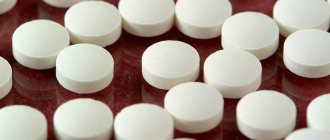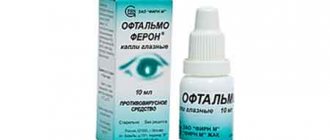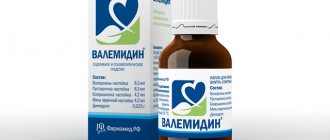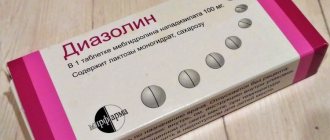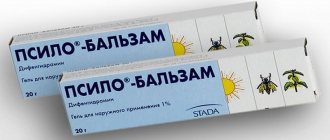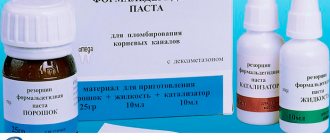Pharmacodynamics and pharmacokinetics
The main active ingredient is Diphenhydramine . The mechanism of action is based on the inhibitory effect of the drug on central, cholinergic structures, blocking H3-histamine receptors in the brain. Diphenhydramine relieves attacks of itching, tissue edema, hyperemia, prevents spasms of smooth muscle tissue, and has a positive effect on capillary permeability . Taking oral forms causes a short-term feeling of numbness in the mouth. The drug has antiparkinsonian, hypnotic, sedative, and antiemetic effects. By blocking the cholinergic receptors of the ganglia, it reduces blood pressure and can increase existing hypotension . In persons with epilepsy and local brain damage, even low doses of the drug Diphenhydramine can provoke an epileptic attack , and the EEG shows activation of epileptic discharges. The drug is most effective for bronchospasm provoked by taking histamine liberators (morphine, tubocurarine). The drug is least effective for bronchospasm of allergic origin. With repeated doses, the hypnotic and sedative effects are more pronounced. The drug begins to act an hour after entering the body, the effective effect lasts up to 12 hours.
Rules for storing Diphenhydramine in pharmacies and clinics
Order of the Ministry of Health and Social Development of the Russian Federation No. 706n dated August 23, 2010 approved a list of rules according to which the storage of medicines is organized in medical institutions of the Russian Federation.
In drug storage rooms, air conditioners and other equipment are installed to maintain a constant temperature and humidity that meet the requirements of manufacturers of pharmaceutical products.
Diphenhydramine is a potent medicine that must be stored with caution. Therefore, diphenhydramine is stored in a separate locked cabinet with other potent drugs.
In pharmacies, expired diphenhydramine is destroyed along with other potent drugs according to the instructions. Special organizations are involved in the disposal of expired medicines.
Transportation of diphenhydramine is carried out in accordance with the instructions “Requirements for the conditions of storage and transportation of medicines and packaging materials at enterprises and organizations of the chemical and pharmaceutical industry. RDI 64-31-84"
Indications for use of Diphenhydramine
Why and for what purpose are tablets and solution prescribed?
The drug is used to relieve allergic reactions, with itchy dermatosis , allergic dermatitis, rhinosinusitis , vasomotor rhinitis, acute iridocyclitis , allergic conjunctivitis. The drug is used for insomnia, chorea, Parkinson's disease, radiation sickness, air sickness, sea sickness, Meniere's syndrome , vomiting in pregnant women. The drug is prescribed as a premedication for extensive traumatic injuries to soft tissues and skin, serum sickness, and hemorrhagic vasculitis .
Diphenhydramine (Diphenhydramine)
Diphenhydramine is a first-generation antihistamine used to treat a range of conditions, including allergic symptoms and itching, colds, insomnia, motion sickness, and extrapyramidal symptoms. Diphenhydramine is significantly more effective in treating allergies than newer generation antihistamines. As a result, it is often used in cases where allergic reactions require a quick, effective remedy against the massive release of histamine. Diphenhydramine is available as a drug approved for sale in pharmacies without a prescription. Diphenhydramine injection solution is available only with a doctor's prescription. Diphenhydramine injections may be used in case of life-threatening reactions (anaphylaxis) to allergens such as bee stings, peanuts or latex, as an adjunct to epinephrine. As a potent antagonist of acetylcholine at muscarinic receptors, diphenhydramine is used to treat extrapyramidal symptoms similar to Parkinson's disease caused by typical antipsychotic drugs. Antagonism of muscarinic receptors leads to correction of the levels of dopamine, a neurotransmitter responsible for controlling motor function of the brain, similar to the action of other antimuscarinic drugs such as atropine. Diphenhydramine can cause severe sedation and is also used as an anxiolytic. In addition, the drug has been shown to have a mild anti-obsessive effect. Originally developed as a control drug, it actually produces a significant reduction in obsessive-compulsive disorder symptoms. Because of these sedative properties, Diphenhydramine is widely used for insomnia in over-the-counter sleep medications. The maximum recommended dose, as directed by the US FDA, is 50 mg (as the hydrochloride salt). The drug is included as an ingredient in several products marketed as sleep aids, alone or in combination with other ingredients such as acetaminophen (paracetamol). An example of the latter is the drug Tylenol PM. Examples of products containing diphenhydramine as the sole active ingredient are Unisom, Tylenol Simply Sleep, Nytol, ZzzQuil and Sominex (version sold in the US and Canada; Promethazine is used in the UK). Tolerance to the sedative effects of Diphenhydramine appears very quickly; after three days of use at the total dosage, the drug is no longer more effective than placebo. Diphenhydramine also has antiemetic properties, making it useful in relieving the symptoms of nausea associated with motion sickness. Because the drug causes significant sedation in many users, newer generations of antihistamines, including Loratadine, Cetirizine, and Dimenhydrinate, may be preferable for use. Topical diphenhydramine is also available, including in creams, lotions, gels, and aerosols. They are used to relieve itching and have the advantage of causing far fewer systemic effects (i.e., drowsiness) than oral forms of the drug. Diphenhydramine, when applied topically, also has anesthetic properties and is used in patients allergic to general local anesthetics such as lidocaine.
Contraindications
Diphenhydramine is not prescribed for prostatic hyperplasia, angle-closure glaucoma, epilepsy, bladder stenosis, or stenosing peptic ulcer of the digestive system. For bronchial asthma, breastfeeding, pregnancy, prescribe with caution.
Side effects
Taking the drug can cause tremor, dizziness, numbness in the oral cavity, dry mouth, increased drowsiness, photosensitivity , asthenia, headaches, nausea, accommodation paresis , decreased speed of psychomotor reaction, and impaired coordination of movements. The use of the drug Diphenhydramine in children may be accompanied by a feeling of euphoria , irritability, and paradoxical insomnia.
Instructions for use of Diphenhydramine (Method and dosage)
Diphenhydramine tablets, instructions for use
30-50 mg one to three times a day, duration of therapy 10-15 days.
For insomnia, 50 mg is prescribed half an hour before bedtime.
For postencephalic, idiopathic parkinsonism, 25 mg three times a day is initially prescribed, subsequently the dosage is gradually increased to 50 mg 4 times a day.
For motion sickness, you need to take 25-50 mg tablets every 6 hours.
Instructions for use of Diphenhydramine in ampoules
A solution of Diphenhydramine is administered intravenously 20-50 mg of the drug, having previously dissolved in 100 ml of 0.9 sodium chloride, intramuscular injections of 10-50 mg are administered once.
Instructions for the use of rectal suppositories with Diphenhydramine
Rectal suppositories after a cleansing enema are administered twice a day.
Using drops with Diphenhydramine
In ophthalmology, 2 drops of solution (0.2-0.5%) are instilled into each conjunctival sac 3 times a day.
In allergology, 0.05 g of the drug is administered intranasally.
Instructions for use and dosage
Diphenhydramine tablets taken orally 30 or 50 mg per day 1 to 3 times a day. Duration of therapy is from 10 to 15 days. The maximum single dosage for adults is 100 mg, daily dosage is 250 mg. Take half an hour before bedtime.
Doctors do not recommend taking Diphenhydramine for children under 7 months. The need to take the drug depends on the disease, the characteristics of the baby’s body, and his age. For sleep problems, children are given milder sleeping pills and sedatives. Children aged 2 to 6 years old receive 12.5 or 50 mg every 4-6 hours, from 6 to 12 years old they receive 25 or 50 mg 3-4 times a day. If a liquid form is used, inject slowly 20 or 50 mg. For intravenous administration, dilute in 9% sodium chloride solution.
Diphenhydramine is contraindicated during pregnancy and breastfeeding. If there is an urgent need, it is used only as prescribed by a doctor.
Attention! Diphenhydramine is contraindicated in the first and second trimesters. The drug is not prescribed during feeding, as there is a possibility of complications developing in the baby.
Patients over 65 years of age are not recommended to use Diphenhydramine for sleep. There is a risk of accommodation disturbance, dizziness, urinary retention, memory loss, and constipation. A doctor's consultation is required.
Diphenhydramine overdose
Taking high doses causes depression of the nervous system, paresis of the digestive organs, dry mouth, dilated pupils, and depression. A specific antidote has not been developed; intravenous administration of plasma-substituting fluids and the use of drugs that increase blood pressure are required. It is unacceptable to use analeptics, epinephrine .
In case of severe overdose, death, injury, heart attack, and paralysis are possible.
special instructions
The medication has a negative effect on activities that require increased concentration, control of complex mechanisms, and driving vehicles. During therapy, it is necessary to avoid drinking alcoholic beverages and limit exposure to the sun and ultraviolet radiation to a minimum. The antiemetic effect of the drug can mislead the doctor in the differential diagnosis of acute appendicitis , recognizing the symptoms of overdose, and intoxication.
International name (INN) of Diphenhydramine: Diphenhydramine.
The Pharmacopoeia contains a description under FS 42-0232-07.
Described on Wikipedia under the name Diphenhydramine.
It is often necessary to know the name of a drug in Latin. Here, for example, is the recipe in Latin:
Rp.: Dimedroli 0.05 D. td N 10 in tabul. S.
Sticks with Diphenhydramine in Latin: baculi cum dimedrolum.
Structural formula of the active substance:
Is Diphenhydramine a drug?
In fact, the medication is not a drug, but in combination with alcoholic drinks and in large doses it causes hallucinations, as well as addiction if used frequently.
Can I take Diphenhydramine in ampoules?
In general, it is possible, but the concentration of the active substance in ampoules is less than in tablets.
Contraindications and special instructions
Diphenhydramine is contraindicated for:
- stenosing gastric ulcer;
- lactation;
- bearing a child;
- excessive sensitivity to the components in the composition;
- angle-closure glaucoma;
- bladder neck stenosis;
- pyloroduodenal obstruction;
- benign enlargement of the prostate gland.
Carry out therapy with special attention in case of lung pathologies, in case of increased intraocular pressure, in case of vascular and heart diseases, and in old age. It is not recommended to use the medication for people who drive a vehicle or need increased concentration.
An alcoholic cannot take the drug. Mixing diphenhydramine with alcohol leads to narcotic intoxication.
Analogs
Level 4 ATC code matches:
Benadryl
Clemastine
Sungmil
Donormil
Tavegil
Analogues are Kalmaben , Dramina .
Diphenhydramine price, where to buy
The price of Diphenhydramine tablets is 3-6 rubles per pack of 10 pieces. How much do tablets cost in Ukraine? The package can be purchased for 6-8 hryvnia.
You can buy Diphenhydramine in ampoules at a price of 25-30 rubles for 10 pieces in Russia and for 15-18 UAH in Ukraine.
- Online pharmacies in RussiaRussia
- Online pharmacies in UkraineUkraine
- Online pharmacies in KazakhstanKazakhstan
Pharmacy Dialogue
- Diphenhydramine (amp. 1% 1 ml No. 10 (5x2)) Belmedpreparaty
24 rub. order - Diphenhydramine tablets 50 mg No. 20DHF JSC
11 rub. order
- Diphenhydramine tablets 50 mg No. 10DHF JSC
4 RUR order
- Diphenhydramine (amp. 1% 1ml No. 10) DHF JSC
30 rub. order
show more
PaniPharmacy
- Diphenhydramine ampoule Diphenhydramine solution d/in.
1% amp. 1ml No. 10 Ukraine, Health of the people LLC 17 UAH. order - Diphenhydramine ampoule Diphenhydramine solution d/in. 1% amp. 1ml No. 10 Ukraine, Darnitsa ChAO
23 UAH order
- Diphenhydramine ampoule Diphenhydramine solution d/in. 1% amp. 1ml No. 10 Ukraine, Galichfarm JSC
14 UAH order
show more
Shelf life of Diphenhydramine
- Diphenhydramine tablets have a shelf life of up to 5 years; it must be stored in a place protected from light at a temperature not exceeding +30 °C.
The expiration date is indicated on the cardboard packaging, as well as on each cell or non-cell packaging.
- Diphenhydramine in ampoules has a shelf life of up to 4 years; it is recommended to store it at a temperature no higher than 25°C in a dark place. The expiration date marking is located on each ampoule, as well as on the box.
- Diphenhydramine gel 1%, available in 30 g tubes, used only for external use. The tubes are placed in cardboard boxes, which indicate a shelf life of up to 3 years, and the expiration date is indicated on the seam of the tube. Store at a temperature not exceeding 25°C.
Medicines must be stored in the conditions recommended by the manufacturers; temperature changes negatively affect the healing properties.
But regarding the expiration date, there is a rule that you can add 10% of time to the expiration date indicated on the package and the drug will not lose its medicinal properties.
Spoiled tablets can be identified by their appearance:
- change color
- begin to crumble in your hands,
- the consistency of the tablets may become viscous,
- a sour smell appears.
If the diphenhydramine solution in the ampoules becomes cloudy and a sediment appears, it means the medicine has deteriorated and must be disposed of.
The use of low-quality, expired drugs is strictly not recommended, since they can seriously harm your health
Diphenhydramine has a fairly long shelf life because it is a one-component drug. One tablet of medicinal preparations contains only diphenhydramine, and all other components are excipients.
